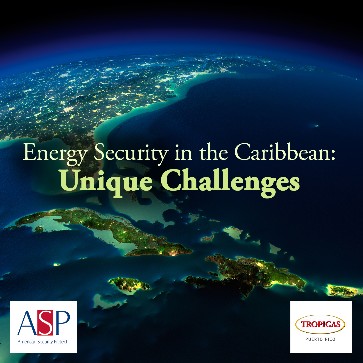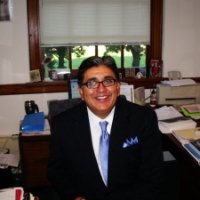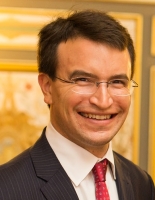
Energy Security in the Caribbean: Panel 1: Energy, Economics, & Geopolitics
Panel One: Energy, Economics, & Geopolitics in the Caribbean
Date: February 4, 2015
Time: 12:45pm – 2:00pm
Location: 1100 New York Avenue, NW 7th Floor, West Tower
Join ASP and our panelists in a discussion about energy security issues in the Caribbean.
This panel will examine the complicated overlap of geopolitics and economics in the Caribbean. It will discuss the effect of oil price decreases on the Petrocaribe program, Venezuela’s influence, and the changing economics of oil. It will look at how the US role has changed from an energy buyer to an energy exporter. It will show how dependence on fuel oil has harmed economic growth in the region. Finally, it will look at how energy issues will (or won’t) impact the warming relations between Cuba and the US.
Speakers
Panelist: Jonathan Benjamin-Alvarado
 Jonathan Benjamin-Alvarado is the Assistant Vice Chancellor and Professor of Political Science at the University of Nebraska at Omaha (UNO), with an emphasis on U.S. Foreign Policy, International Development and National Security. He is also Director of the Intelligence Community Scholars Program at UNO which is a member of the Great Plains National Security Education Consortium. He was Treasurer of the American Political Science Association, founding Assistant Director for Research and Outreach for the UNO Office of Latino and Latin American Studies (OLLAS), and is a Senior Faculty Associate with the University of Georgia’s Center for International Trade and Security.
Jonathan Benjamin-Alvarado is the Assistant Vice Chancellor and Professor of Political Science at the University of Nebraska at Omaha (UNO), with an emphasis on U.S. Foreign Policy, International Development and National Security. He is also Director of the Intelligence Community Scholars Program at UNO which is a member of the Great Plains National Security Education Consortium. He was Treasurer of the American Political Science Association, founding Assistant Director for Research and Outreach for the UNO Office of Latino and Latin American Studies (OLLAS), and is a Senior Faculty Associate with the University of Georgia’s Center for International Trade and Security.
He has conducted research related to Cuba’s efforts to develop a nuclear energy capability and broader energy development issues. Since 1992, he has visited Cuba 27 times for field research on energy and economic development and has conducted interviews with a number of senior government officials in Cuba’s energy and related agencies. He has served as a technical advisor to a number of US delegations to Cuba and Latin America states on energy development, national security and strategic (nonproliferation) trade issues.
He has published numerous articles, monographs and commentaries on these subjects in Spanish, Russian, German and English in newspapers, scholarly and policy journals including The Political Science Quarterly, The Nonproliferation Review, Cuba in Transition, and Yaderni Kontrol (Russia). In 2012, he edited Cuba’s Energy Future: Strategic Approaches to Cooperation with the Brookings Institution Press. He is also the author of Power to the People: Energy and the Cuban Nuclear Program (Routledge, Inc., 2000). He has worked in collaboration on projects with the Center for Nonproliferation Studies, the Brookings Institution, the World Security Institute, the Carnegie Endowment for International Peace, the MacArthur Foundation and the Ford Foundation. He received his Ph.D. from the University of Georgia in 1997, and M.A. from the Monterey Institute of International Studies in 1992.
Panelist: Christian Gómez, Jr
 Christian Gómez, Jr. is director of energy at the Washington office of the Council of the Americas. In this capacity, he coordinates the activities of the Council’s Energy Action Group, a private-public dialogue on hemispheric energy issues that develops strategic energy policies and publishes working papers on key hemispheric energy topics. Prior to joining COA in 2013, Gómez was a consultant at the International Finance Corporation (IFC), focusing on business models that reach the base of the pyramid worldwide. He was previously program assistant for democratic governance at the Inter-American Dialogue and served as executive director of Princeton in Latin America (PiLA). Gómez started his career at the Arias Foundation for Peace and Human Progress in San José, Costa Rica.
Christian Gómez, Jr. is director of energy at the Washington office of the Council of the Americas. In this capacity, he coordinates the activities of the Council’s Energy Action Group, a private-public dialogue on hemispheric energy issues that develops strategic energy policies and publishes working papers on key hemispheric energy topics. Prior to joining COA in 2013, Gómez was a consultant at the International Finance Corporation (IFC), focusing on business models that reach the base of the pyramid worldwide. He was previously program assistant for democratic governance at the Inter-American Dialogue and served as executive director of Princeton in Latin America (PiLA). Gómez started his career at the Arias Foundation for Peace and Human Progress in San José, Costa Rica.
He has been interviewed in print and broadcast media, and he has authored or co-authored articles in The Miami Herald, El Universal, U.S. News and World Report, Latin Business Chronicle, Foreign Policy Digest, and Latin America Advisor. He is also a contributing blogger to AQ Online. Gómez received an MBA from the Wharton School of the University of Pennsylvania, an MA from the Paul H. Nitze School of Advanced International Studies (SAIS) of Johns Hopkins University, and an AB with honors in Political Economy and Latin American Studies from Princeton University.
Conference Details: Energy Security in the Caribbean: Unique Challenges







[…] first panel examined the complex overlap of geopolitics and the economics in the Caribbean. The panelists […]